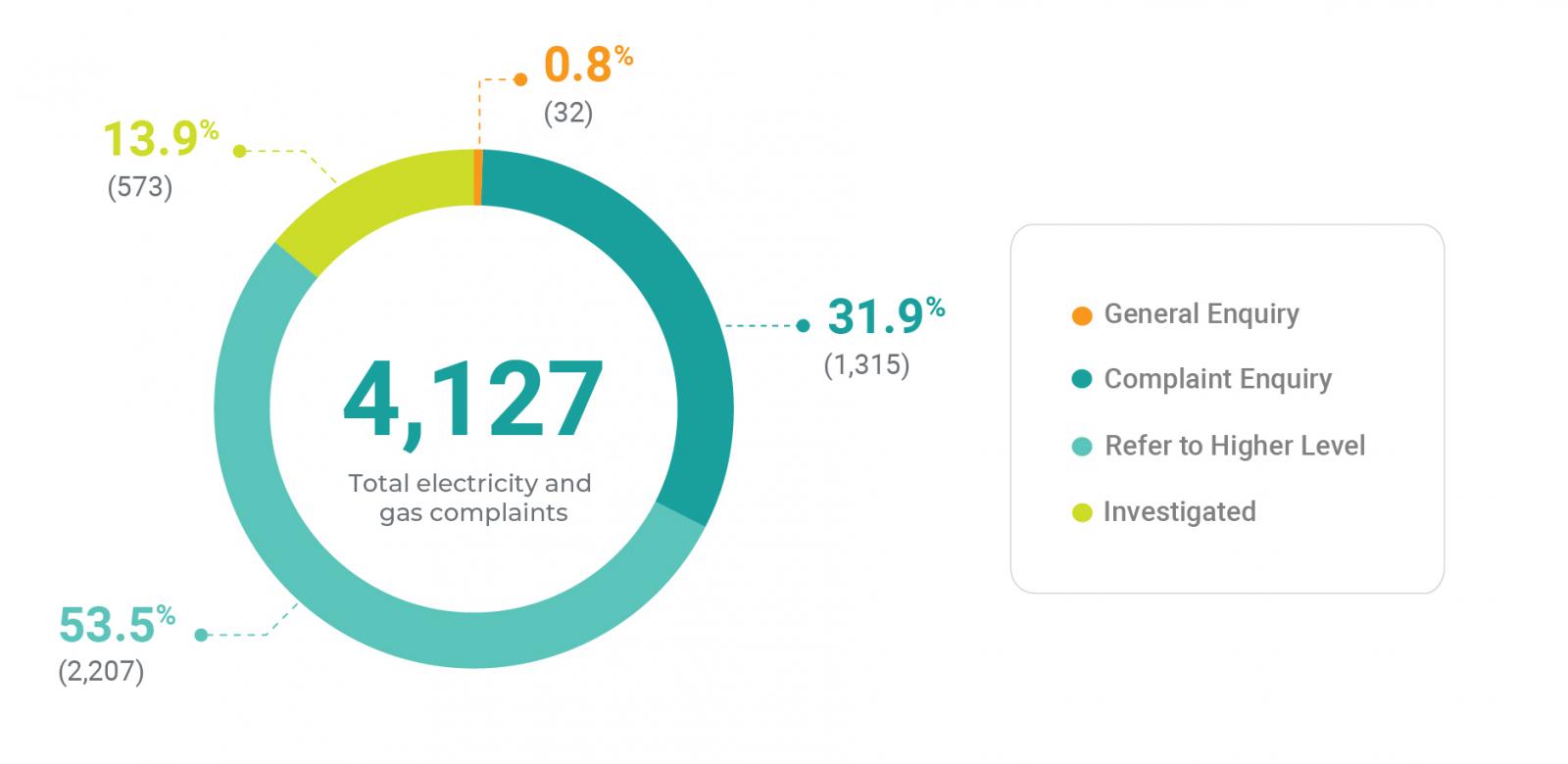-
Home
-
Publications and submissions
-
Reports
-
EWON Insights
-
EWON Insights Jan-Mar 2023
- Energy complaints and case studies
Energy complaints and case studies

Table 4 - Energy complaint breakdown, January to March 2023
|
Complaint type |
Number of complaints |
% total energy complaints |
|---|---|---|
|
General enquiry |
32 |
0.8% |
|
Complaint enquiry |
1,315 |
31.9% |
|
Refer to higher level |
2,207 |
53.5% |
|
Investigated |
573 |
13.9% |
|
Total |
4,127 |
100% |
Rebates
With current cost of living pressures and rising energy costs it is likely that more customers will have difficulty paying their energy bills. Consequently, customers will seek ways to reduce their bills, by switching to receive lower rates, or finding available assistance.
EWON assists customers through providing information about available rebates. This is done by our Dispute Resolution Team and through community engagement at events across NSW. Many customers are not aware of government assistance or their eligibility for these schemes, and there are several rebates that are under utilised.
The NSW Social Programs for Energy Code forms the basis for the retailer provision of NSW Government rebates. Customers may also be eligible for Federal rebates relating to medical equipment. Customers contact EWON for a range of issues regarding rebates, and this can include issues relating to data verification such as addresses not matching, name issues, eligibility requirements and rebates not being applied to bills appropriately.
Customers who are not receiving eligible rebates often express their frustration about the higher than expected bills they receive and also express dissatisfaction about the additional administrative burden of applying for Rebates.
Many issues with rebates could be resolved by retailers directly, through additional data verification and therefore obviate the need for an EWON investigation. At the same time, many complaints we receive highlight the complex process that customers and retailers have to navigate.
 Security measures stop retailer verifying customer details
Security measures stop retailer verifying customer details
A customer contacted her retailer to request the NSW Gas Rebate be applied to her account. She had contacted the retailer on multiple occasions and was advised that the rebate could not be applied because of a mismatch with her postcode and the details on the Centrelink database.
The customer told the retailer that details of her address had been suppressed by court order because of family violence, however this had only impacted her application for energy rebates. She also explained she had health issues that require heating to help regulate her body temperature. The rebate would assist her with her bills.
The customer contacted EWON for assistance as her interactions with the retailer were causing her stress and she was not satisfied with the level of customer service.
When EWON contacted the retailer, it said the customer was not receiving any rebate on her gas or electricity account. It also said it has no control over rebate validation as this was done by the Commonwealth Department of Human Services and not by energy retailers.
The retailer explained that when it attempted to validate her details, the only issue was related to the postcode, and the validation returned a ‘no’ which meant the rebate could not be applied. The retailer was unable to manually apply a different postcode. It also advised that the validation process would be successful if Centrelink updated the postcode verification from ‘no’ to ‘unable to confirm’.
 EWON discussed this information with the customer and explained that retailers do not have any control over the Centrelink database. The customer was satisfied with the explanation and would contact Centrelink to discuss the matter further. The retailer also said that Centrelink could liaise with it on her behalf, if required.
EWON discussed this information with the customer and explained that retailers do not have any control over the Centrelink database. The customer was satisfied with the explanation and would contact Centrelink to discuss the matter further. The retailer also said that Centrelink could liaise with it on her behalf, if required.
 Rebate no longer applied after accepting new contract
Rebate no longer applied after accepting new contract
A customer changed her electricity plan with her retailer as her current benefit period was ending. The retailer said the new discount would be higher and her bills would decrease.
The customer had lived at the property since 2014 and her normal electricity bills were about $350 per quarter. She received an electricity bill for 19 January to 20 April 2022 for $560, which she considered to be too high. She contacted her retailer to dispute the bill and it said it would review the bill and contact her within 48 hours. She did not hear from the retailer and tried to contact it on multiple occasions, however she was not able to resolve the issue. She received another bill for 21 April to 17 July 2022 for $480. She contacted the retailer again, but did not receive a response.
The customer contacted EWON for assistance and said she thought she was given incorrect information before changing contracts, as her usage on the disputed bills was similar to her historical bills. We initially referred the complaint to the retailer at a higher level, however the customer returned to EWON as she was not satisfied with the information she was provided.
EWON contacted the retailer to discuss the account and it said the NSW Low Income Household Rebate had not been applied to the account because of a mismatch with the address on her concession card, the Market Settlement and Transfer Solutions database and the address on the account. The retailer applied a credit of $285 to the customer’s account, to backdate the missing rebate for a period of twelve months, confirmed the details on the account were updated and confirmed the rebate would apply to future bills.
 The retailer acknowledged that the electricity plan offered was not the most beneficial to the customer and offered to apply a credit of $450 to her account, which represented the difference between what she was billed and what she would have been billed on the old contract rates. It also confirmed that the customer had since been moved to the best available offer.
The retailer acknowledged that the electricity plan offered was not the most beneficial to the customer and offered to apply a credit of $450 to her account, which represented the difference between what she was billed and what she would have been billed on the old contract rates. It also confirmed that the customer had since been moved to the best available offer.
The credits applied to the account reduced the balance of the account to $750 and the customer was referred to contact the retailer directly to discuss payment of the account, if required. The customer was satisfied with the outcome.
 Conflicting information provided to customer about rebate eligibility
Conflicting information provided to customer about rebate eligibility
A customer contacted his electricity retailer in September 2022 to provide his concession card details and request the NSW Low Income Household Rebate be applied to his account. He was advised that he was entitled to receive the rebate, however he then received a letter saying he was not entitled to it.
He contacted his electricity retailer to dispute the letters. It advised him that it would investigate the matter as the verification for the rebate failed in the portal with Services Australia. The customer had checked with Services Australia and was advised that his details were correct and that he was eligible to receive the rebate.
The customer contacted EWON for assistance as he was not able to resolve the matter with the retailer. We initially referred the complaint to the retailer at a higher level, however the customer returned to EWON as he was unable resolve the issue.
EWON contacted the retailer to request further information. It said it had tried to verify the customers information with Services Australia however they said he was not eligible for the rebate. The retailer had also tried to verify the rebate for his wife, as she was a joint account holder, but she was also ineligible.
 EWON reviewed the eligibility criteria and discovered the customer had a Low Income Healthcare Card, not a Health Care Card, and this would impact his eligibility for the rebate. We informed the customer he may be eligibility for other rebates and recommended he contact Service NSW to discuss other options.
EWON reviewed the eligibility criteria and discovered the customer had a Low Income Healthcare Card, not a Health Care Card, and this would impact his eligibility for the rebate. We informed the customer he may be eligibility for other rebates and recommended he contact Service NSW to discuss other options.
Deceased estates
EWON has highlighted complaints about deceased estates in previous EWON Insights reports. We have noted that finalising the affairs of a deceased family member is stressful. Managing the account closure effectively and with empathy can avoid further distress and anxiety.
We also highlighted the Australian Death Notification Service (ADNS), a collaboration of Births, Deaths and Marriages registries across Australia. The ADNS enables people to notify government and non-government agencies, organisations, and institutions that someone has died with a single contact.
While we do not receive a high number of complaints about this issue, the complaints we receive highlight the difficult process family members face when trying to navigate finalising their affairs.
The following case studies show that difficulties are still being experienced by family members, providing opportunities for retailers to improve the experience.
 Advocate had to establish their own electricity account to close the account of deceased family member
Advocate had to establish their own electricity account to close the account of deceased family member
After the death of her family member, an advocate contacted the electricity retailer to close the electricity account for the property. The retailer advised the advocate that for the account to be closed, she had to establish an account in her own name and that the process would also involve a check of her credit history.
The advocate disputed this with the retailer, as she considered the process unreasonable, however it advised her that the process was correct and that they were unable to close the other account, without her taking responsibility for the billing at the property.
 The advocate contacted EWON for assistance as she was not satisfied with the customer service that she had experienced. EWON referred the matter to the retailer for resolution at a higher level, with the knowledge that she could return to us if she was unhappy with the outcome.
The advocate contacted EWON for assistance as she was not satisfied with the customer service that she had experienced. EWON referred the matter to the retailer for resolution at a higher level, with the knowledge that she could return to us if she was unhappy with the outcome.
 Errors and delays cause stress to family member
Errors and delays cause stress to family member
Following the death of her husband in 2022, a customer contacted the electricity provider to close the account in his name and establish an account in her name. The retailer told the customer that she was responsible for the final account, however she did not receive a bill or a welcome pack for the new account.
Two months later the customer contacted the retailer to ask about the final bill for the closed account and the welcome pack for the new account. The retailer said she was not responsible for the final account and did not address her concerns about the welcome pack.
She continued to contact the retailer to ask about a bill in her name, but it told her an account had not been set up. It said an account would be set up and that it would call her back to discuss the matter further. The customer did not receive any further contact, and four months after the initial contact with the retailer, she asked an advocate to contact EWON on her behalf for assistance.
We initially referred the matter to the retailer at a higher level, to allow the retailer an opportunity to respond to the customer’s complaint, however the advocate returned to EWON because of ongoing lack of contact which was causing the customer a considerable amount of undue stress.
 EWON contacted the retailer and it explained there had been a number of issues on the account including agent error and a delay in establishing a new account. To resolve the complaint the retailer opened the new account in the customer’s name, from the date that the account was initially requested and waived the initial bill of $480. It also applied an additional credit of $200 to the customer’s account in recognition of poor customer service. It also said there was a credit on the closed account for $220 and it would issue a cheque in the customer’s name. The customer was satisfied with the outcome.
EWON contacted the retailer and it explained there had been a number of issues on the account including agent error and a delay in establishing a new account. To resolve the complaint the retailer opened the new account in the customer’s name, from the date that the account was initially requested and waived the initial bill of $480. It also applied an additional credit of $200 to the customer’s account in recognition of poor customer service. It also said there was a credit on the closed account for $220 and it would issue a cheque in the customer’s name. The customer was satisfied with the outcome.

